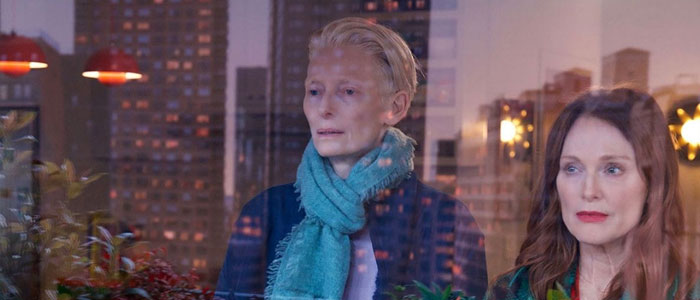***/****
starring Julianne Moore, Tilda Swinton, John Turturro, Alessandro Nivola
written by Pedro Almodóvar, based on the novel What Are You Going Through by Sigrid Nunez
directed Pedro Almodóvar
By Angelo Muredda Nobody dresses a set quite like Pedro Almodóvar. The tasteful, colour-coordinated accoutrements of a bourgeois life well-lived–elegant throw pillows and couches, the right Pantone mug and the perfect bookshelf, beautifully draped and brightly saturated garments–have lent his later films an air of aloof, upper-middle-class refinement at odds with the sexual frankness and messy spectrum of human emotions that were once his stock-in-trade. But in his latest, The Room Next Door, the tastefulness that sometimes feels like a late-style diversion from his singular traits as an artist is the point, an expression of his protagonists’ moral imperative to surround themselves with beautiful things to face the end of life with dignity.
As drawn to beautiful people as he is to objects, Almodóvar shapes his first English feature as a two-hander starring a pair of grand dames: Julianne Moore as Ingrid, a well-to-do writer who’s just published a book that ostensibly sorts her complicated feelings on death (which, it turns out, remain completely unresolved), and Tilda Swinton as Martha, a war correspondent who reacts to the knowledge that her latest experimental cancer treatment has failed by taking the timing and circumstances of her death into her own hands as she did her life, acquiring a foolproof euthanasia pill on the dark web. (Whether that flimsy conceit is intended as camp or lost in translation in the move to English is a bit hard to parse.) A chance encounter with a mutual at a book signing brings Ingrid back into her estranged friend Martha’s orbit, and the two resume their friendship, culminating in Martha inviting Ingrid to accompany her to a rental home in the woods for a month to be beside her in the titular room next door when she dies–acting as a companion in a time of crisis, as her cabal of war reporters used to do. Unable to concentrate on reading or writing from her chemotherapy, she decides to step away from treatment and embrace a good death as a kind of aesthetic project, stylishly curated from the setting to the art direction of the DVDs that line their media shelf (lovingly photographed as they’re popped out of the case and lowered into the player), to her farewell outfit and, finally, the supporting player who will accompany her.
Both actors slip into the type of roles you’d expect of them with ease. Moore’s nervous flightiness serves her well as Ingrid, a woman who cares for her friend but abruptly shuts her down and talks over whenever she gets morbid–more for her own benefit, and to keep things light, than for Martha’s. (Martha has had the foresight to pack an anti-anxiety med for her friend in case Ingrid goes the full manic Julianne Moore during their getaway.) Swinton’s steely resolve and worldly air fill in the blanks of Martha’s colourful biography better than some early, ropey telenovela flashbacks to her youth that feel tonally on loan from more ornately structured Almodóvar melodramas such as Julieta. Their casting to type might feel like a cheat–characterization painting by numbers–if they weren’t so good, instantly reading as reconnecting old friends, the one balancing out the social graces the other lacks.
That’s important for a film that relies heavily on the familiar affective pull of intertextual references for its emotional heft. The women orient themselves through the texts they write as well as the ones they read and watch, including the work of Virginia Woolf (perhaps an allusion to Moore’s role in The Hours) and James Joyce’s “The Dead,” whose ending of snow softly falling on the living and the dead Martha links to a beautiful pink-gilded sunset snowfall at the rental. The end of that story, and the final moments of the John Huston adaptation Martha insists on rewatching after she’s made the connection, become a guiding motif of sorts for Martha, who is effectively curating an exquisitely sad denouement to her own life.
Like a number of narratives about securing a good death, Almodóvar’s has its share of romance about the work of dying well, more or less following Martha’s lead in framing death as a cottage-trip getaway between friends. John Turturro’s irascible public intellectual Damien, a former lover to both women and a legal confidante for Ingrid as she prepares for the potential fallout from being the lone witness to her friend’s death in a state where medically assisted dying is illegal, offers a bit of political nuance to the situation from outside their bubble, which is otherwise only pierced by a religious police officer Alessandro Nivola plays with loathsome self-righteousness. Damien responds to Ingrid’s complaint that everyone should be allowed to die with dignity without having to sneak around by arguing that in America, everyone may soon get that chance, once healthcare has completely collapsed. Almodóvar recognizes how easily choices like Martha’s can drift into a eugenicist policy targeting the ill and disabled, but mainly as an intellectual talking point. A sentimental aesthete with an irrepressible emotional attachment to DVDs, stationery, coffee machines, luxury pyjamas, and wall art, his heart lies with Martha’s desire to go out in style. Programme: Special Presentations






